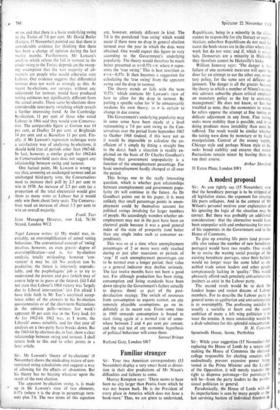Familiar stranger
Sir : Your two American correspondents (15 November) display a very smart hand at distor- tion in their dire predictions of Mr Nixon's difficulties and failures to come.
Murray Kempton says: 'There seems to have been no city larger than Peoria from which he was not beaten back. He is the President of every place in America which does not have a book-store.' Thus, we are given to understand,
Republicans, being in a minority in the citie;, cannot be responsible for city literacy or sophi,- tication; suburban Republicans do not read be- cause the book-stores are in the cities where they work but do not vote; and if, which is uncer- tain, Democrats are a minority in Hicksville they therefore cannot be Hicksville's hicks.
William Janeway says: 'The danger is that failure of one economic meat-axe will open the door for an attempt to use the other one, mone- tary policy, for the same sort of delicate ad- justment. The danger is all the greater because the theory to which a number of Nixon's econo- mic advisers subscribe places critical emphasis on monetary policy as the key to economic management.' He does not know, or has not troubled to note, that the economists to whom he refers oppose the attempt at fine tuning or delicate adjustment in any form. Fine tuning seeks more stability than is possible, and in so doing produces more instability than need be suffered. The result would be similar whether the tuning were done by monetary or by fiscal manipulation. Control of the money supply, Chicago style and perhaps Nixon style to be, seeks broad stability and ensures that minor fluctuations remain minor by leaving them to run their course.
31 Eaton Place, London SW1 -
Arthur Shenfield


































 Previous page
Previous page